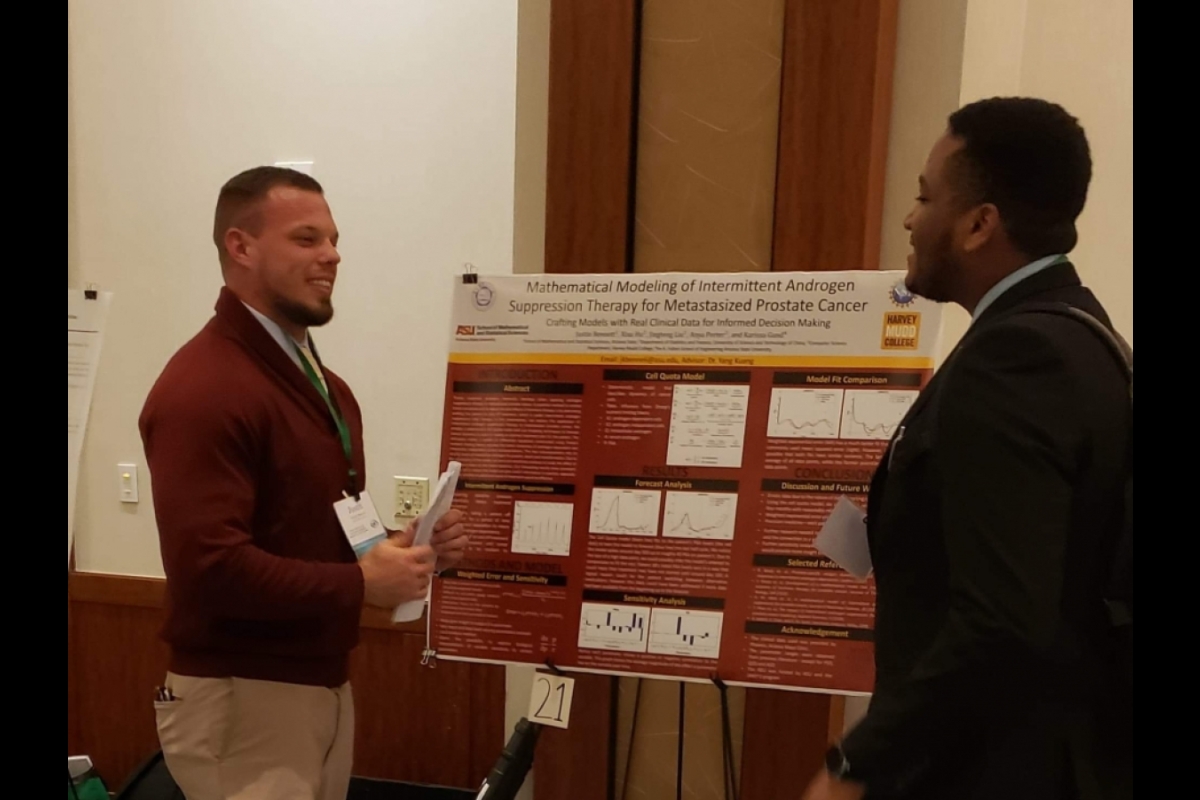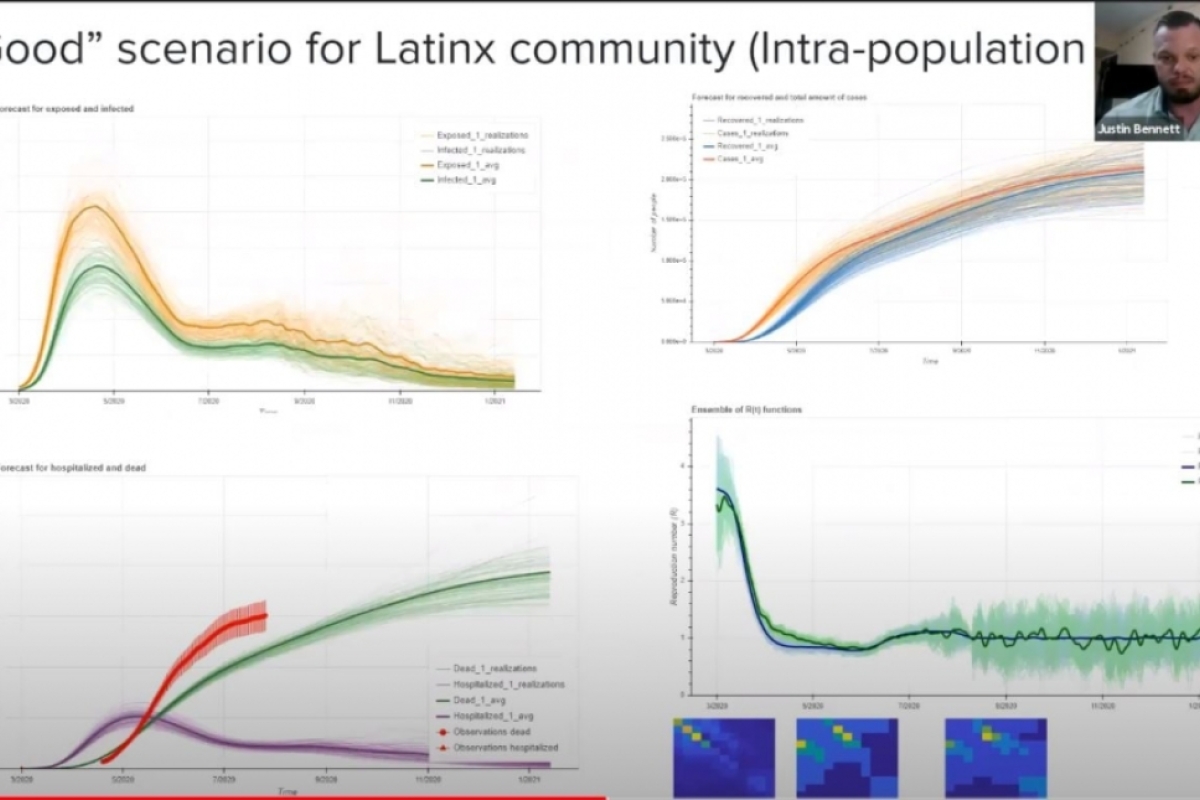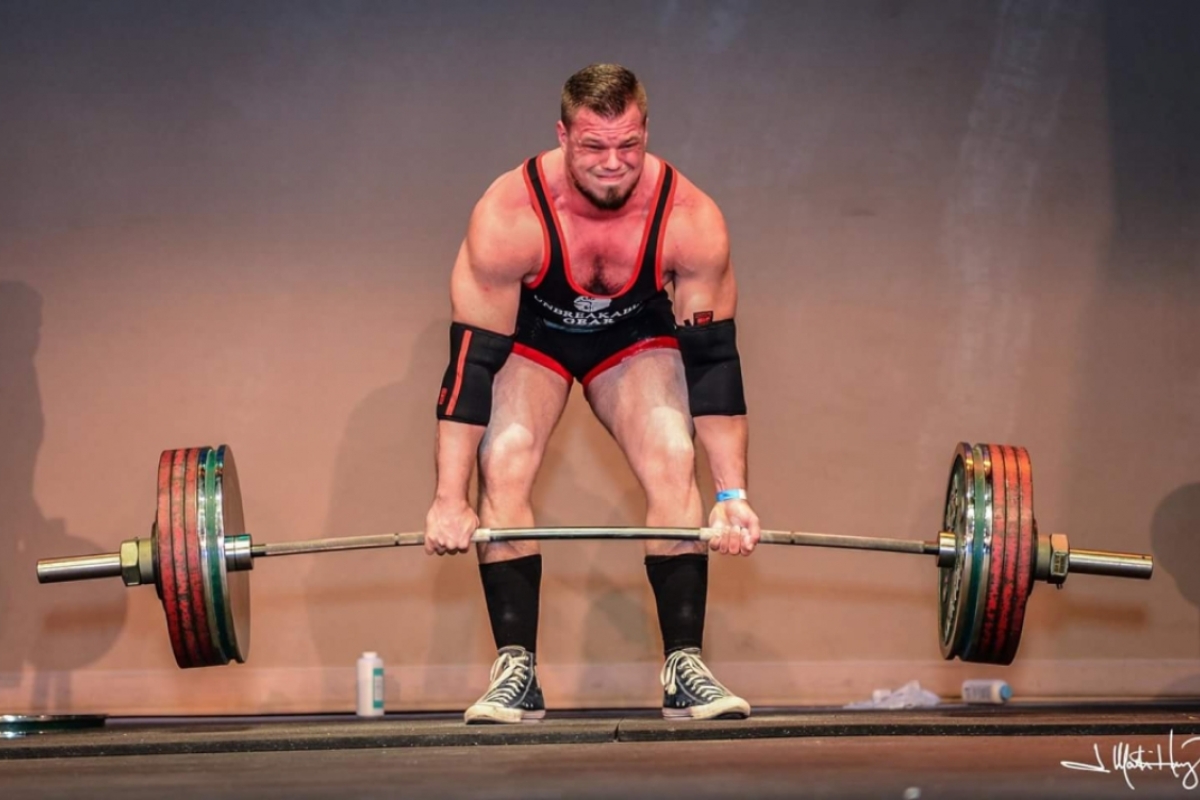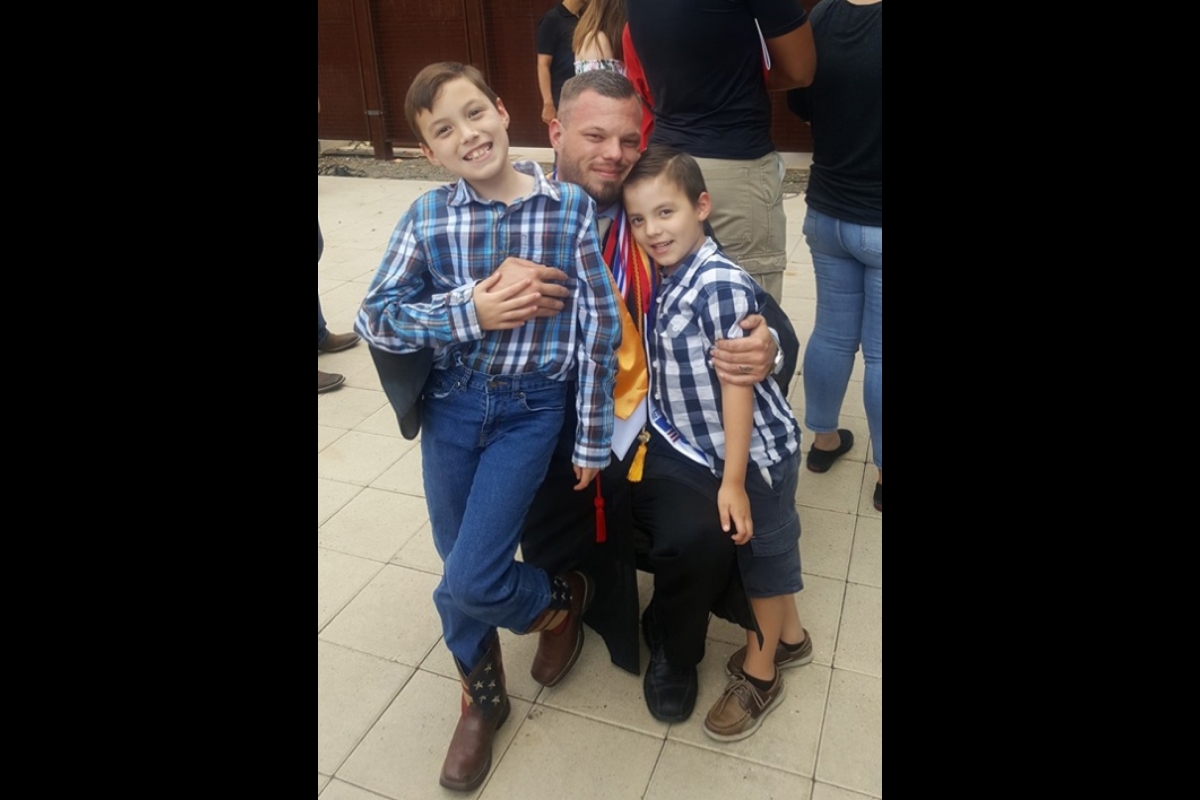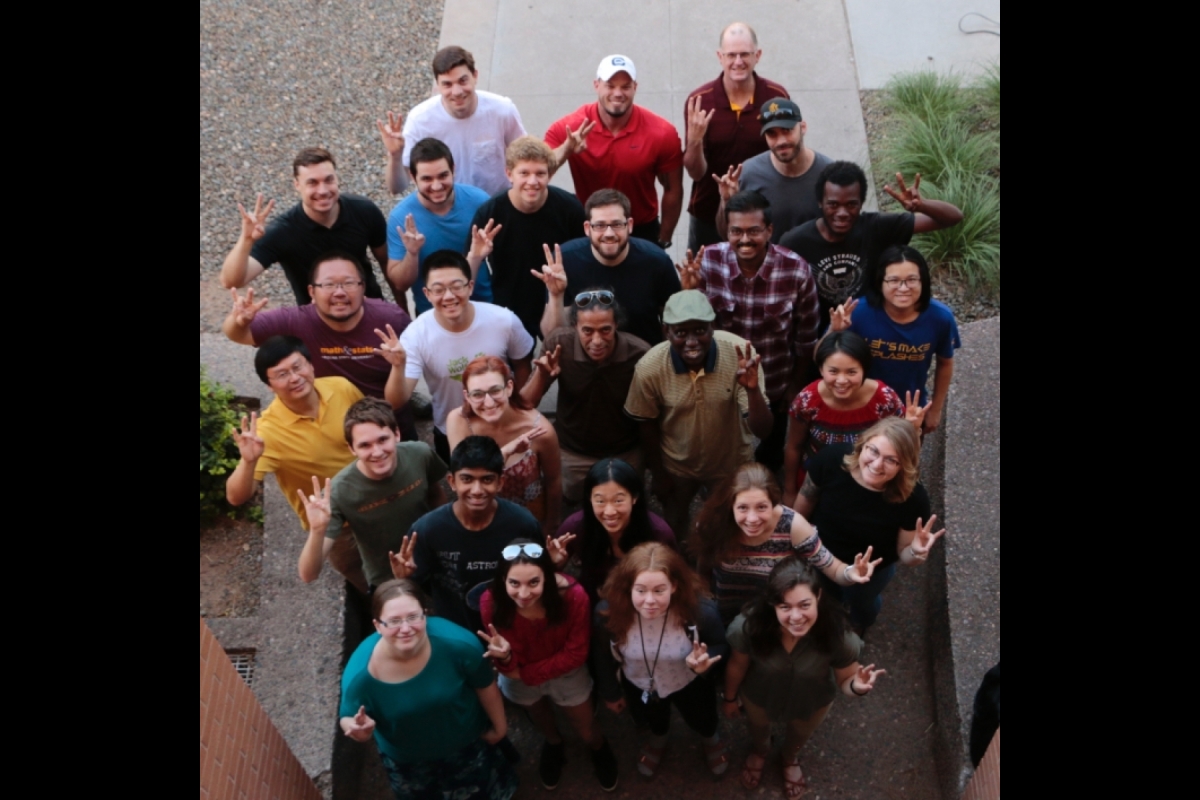Being a role model for kids motivates father to get math degree

Justin Bennett is graduating with a Bachelor of Science degree in mathematics from the School of Mathematical and Statistical Sciences.
Editor's note: This story is part of a series of profiles of notable spring 2021 graduates.
Justin Bennett graduated from high school with a 2.2 GPA and failed almost every math class. One of his high school mathematics instructors told him he would never make it to college.
Bennett grew up in Bryan, Texas. His father left the family, and he lost his mother to drug addiction. He relied on help from friends until he was 18, then enlisted in the Army right out of high school. He did his time in the military, and then worked in the oil fields of west Texas for about five years.
After experiencing trauma in his youth, he did not want a similar life for his own sons, which is why he decided to pursue higher education — for stability.
He moved his family to Arizona in 2015 and worked as a crane operator for a couple of years before enrolling in Glendale Community College. He applied to the Maricopa Community Colleges Nina Mason Pulliam Legacy Scholars program (also known as Nina Scholars). The competitive scholarship is geared toward financially assisting students with dependents, and/or students who have been through the foster care system.
During his first year after transferring to ASU, he became fascinated with mathematical theory, specifically dynamical systems, and the clarity mathematics could bring to science. But it was the stigma that "cancer is incurable" that appealed to his competitive nature and led him to explore further through the NSF-funded (AM)2 research experience for undergraduates (REU). He led a team of two other students to formulate and validate predictive mathematical models of prostate cancer treatment based on clinical data. The summer program helped him realize he wanted to pursue scientific research to better understand human biological systems and ultimately led him to study mathematical oncology.
He took advanced courses in areas of active research, including mathematical models in cancer, partial differential equations in population biology and advances in biological stoichiometry. To build a stronger theoretical background in applied mathematics, he completed graduate coursework in probabilistic measure theory with stochastic processes and applied analysis in computational and applied mathematics. His success in these courses, coupled with his extensive research, led to him receiving the Jack H. Hawes Memorial Mathematics Research Scholarship and the Frederick J. Weber Memorial Scholarship in Mathematics.
“Justin and his summer REU team members worked very hard on improving existing models to better predict intermittent androgen deprivation therapy outcomes in advanced prostate cancer patients,” said Yang Kuang, professor of mathematics and a mentor to Bennett. “Their excellent and timely findings are now published in the SIAM student journal.”
Bennett applied to ASU Nina Scholars in 2019 and grew a support system with both Nina Scholars programs.
“I am a student-parent with two sons, both of which I raise on my own. It has impacted me to have a fiercer drive, for their sake,” said Bennett. “I have to be very careful with the decisions that I make in life, to maximize the time and resources I have at ASU.
“I have an excellent support system through the Nina Mason Pulliam Charitable Trust. Jo Ann Martinez and Tiffany Thornhill, as well as the rest of the trust, have been instrumental in my success. I could not be here without their support. Also, I would have never been set up for success had it not been for my mentors, Drs. Yang Kuang and Eric Kostelich. They will always be father figures to me, and I hope to reciprocate in some way down the line.”
“Justin does not take his college experiences and opportunities for granted,” said Martinez, program director for the Nina Mason Pulliam Legacy Scholars program. “He persists despite all the challenges he has to contend with as a first-generation college student, a returning adult, and as a single parent.”
“He puts every bit that he receives from his new support system by paying it forward to others who could use his help. His humbled nature guided his conviction of service to tutoring his Nina Scholar peers in the subjects of math and physics. He had so much on his shoulders, personally and academically, yet his resilience, perseverance and humility shown through. He never allowed his pride to take over; he asked for help and took to heart the advice and guidance he received. His determination to get ahead of his personal challenges while still giving back to his peers amazed all those who know him. He demonstrated that with tenacity he is more than capable of successfully reaching his future academic and career goals.”
Bennett sought to be the best in many endeavors, including work, school and powerlifting. Before enrolling in community college, he had taken three Arizona state records in the 242 lb. weight class in the United States Powerlifting Association, as well as a national record in the 242 lb. weight class in the World Association of Benchers and Deadlifters. He participated in charity events that involved weightlifting to raise money for children, notably the Unbreakable Showcase of Strength, where he sponsored a terminally ill child through HopeKids Arizona. He also mentored middle school aged kids at Glendale’s Boys and Girls Club, where he helped them with their math homework or taught them creative ways to explore math problems. He empathized with the children for experiencing hardships that were similar to what he had experienced as a child.
In summer 2020, Bennett was one of three undergraduates, in a cohort of 60 participants, chosen to contribute in the American Institute of Mathematics Summer Program, “Dynamics and Data in the COVID-19 Pandemic.” Participants explored ways to battle COVID-19 using applied and computational mathematics. Through this program, Bennett learned about advanced methods in epidemiology, compartmental models, stochastic models, forecasting, ensemble Kalman filtering, data fusion and heterogeneous frameworks. His team developed a framework that uses sequential data assimilation to forecast COVID-19 deaths in Illinois using an age-stratified two-population SEIR model that has accumulated 3000-plus lines of Fortran code.
Precision medicine has been a key area of Bennett’s research as an undergraduate student at ASU. The representation of a patient’s characteristics as the parameters of a model is a key component in many mathematical studies and was the topic of his Barrett honors thesis. In collaboration with Kostelich, Kuang and PhD student Tin Phan, he incorporated key features of several mathematical models for prostate cancer within the framework of Markov chain Monte Carlo to study parameter identifiability. This allowed for necessary observations required for the identification of treatment resistance parameters in prostate cancer patients. Bennett contributed as an author of the manuscript, “Model Preselection in Precision Medicine for Prostate Cancer” that has been submitted for publication in the Journal of Mathematical Biology.
Bennett was recently awarded an NSF Graduate Research Fellowship. He plans to study tumor growth, specifically gliomas, in the human brain by studying the existence of nontrivial solutions to reaction-diffusion based models, then identifying and quantifying the relationship between image pixel intensity and tumor cell density using approaches derived from numerical weather prediction. This project will result in a better understanding of tumor growth, true size and boundaries of the tumor, and predictive tumor models, which shall yield better treatment planning for patients. As an applied mathematician working in mathematical oncology, Bennett will be able to work on projects that can have impacts on health policy and clinical decision-making.
This week, Bennett graduated summa cum laude with a Bachelor of Science degree in mathematics from the School of Mathematical and Statistical Sciences and Barrett, the Honors College.
In August, Bennett plans to move himself and his kids to Baltimore, Maryland, to attend Johns Hopkins University, where he has been admitted to their Applied Math PhD program.
We asked him to share about his journey as a Sun Devil.
Question: What was your “aha” moment, when you realized you wanted to study the field you majored in?
Answer: I was always more interested in statistics, but the exposure to mathematical research under Dr. Kuang was the moment I realized I wanted to study mathematics. The work didn’t seem like work — I found myself frequently enjoying myself while writing and proving lemmas for dynamical systems.
Q: What is something you learned while at ASU — in the classroom or otherwise — that surprised you, that changed your perspective?
A: As an undergrad, I regularly attended the colloquiums at Wexler. Many of the presentations were difficult to interpret, almost like drinking water from a fire hose. But I learned to love attending these — they may take days to break down and understand, but they provide very valuable information.
Q: Which professor taught you the most important lesson while at ASU?
A: Dr. Kuang has been the best teacher I have had, both in and out of the classroom. Besides his knowledge of mathematics, his philosophy and approaches to abstract problems are awe-inspiring. Also, Dr. Kostelich played a very significant role — he was the closest person I have had to a father-figure. He taught me to embrace my drive, and aim for schools like Johns Hopkins at a time in my life when my confidence and mental health were low while being a full-time single father.
Over the course of two years, I also received a lot of support from Dr. Nicolas Lanchier, Dr. Steven Kaliszewski, Dr. Horst Thieme, Dr. Marko Samara, Dr. Yun Kang, Dr. Sharon Crook and Tin Phan. Because of the inclusivity and support I received, I was able to do very well in my studies at ASU, and I would highly recommend the mathematics program to others.
Q: What is the best piece of advice you would give to those still in school?
A: Do what other students don’t. Attend meetings you shouldn’t. Make connections with everyone.
Q: What was your favorite spot on campus, whether for studying, meeting friends or just thinking about life?
A: I have two favorite spots – the Barrett suite on West campus, and Discovery Hall on Tempe campus. Nina Mason Pulliam admin have offices at Discovery, and it’s a great quiet place to study and sleep.
Q: What do you like to do in your spare time for fun?
A: I coach my son’s soccer team, so I like to take both my sons to the park and practice soccer for hours. I also like to work out in my spare time.
Q: What do you think is most misunderstood about math by the general public?
A: “How high can you count?”
Q: If someone gave you $40 million to solve one problem on our planet, what would you tackle?
A: I have to be honest; I am a humanitarian first and a mathematician second. I was raised in a trailer park in a small town in Texas by an economically crippled family – I should not be where I am at today. I got very lucky and made connections after I left my hometown. I sincerely believe that I am going to make an impact in my field in time, but understand that there could be another Terrence Tao or Cedric Villani amongst us, but they can’t even afford to attend university. The idea of university being a luxury is an absurdity. I would use the money to solve this problem – to provide a platform for all humans despite race, gender, socioeconomic background, etc. Admittedly, I am biased and believe that mathematics is the most important and impactful major. Hence, I would like a caveat there that they must major in a math-related field, or at least perform math-related research.
More Science and technology

ASU at the heart of the state's revitalized microelectronics industry
A stronger local economy, more reliable technology, and a future where our computers and devices do the impossible: that’s the…

Breakthrough copper alloy achieves unprecedented high-temperature performance
A team of researchers from Arizona State University, the U.S. Army Research Laboratory, Lehigh University and Louisiana State…

4 ASU researchers named senior members of the National Academy of Inventors
The National Academy of Inventors recently named four Arizona State University researchers as senior members to the prestigious…


